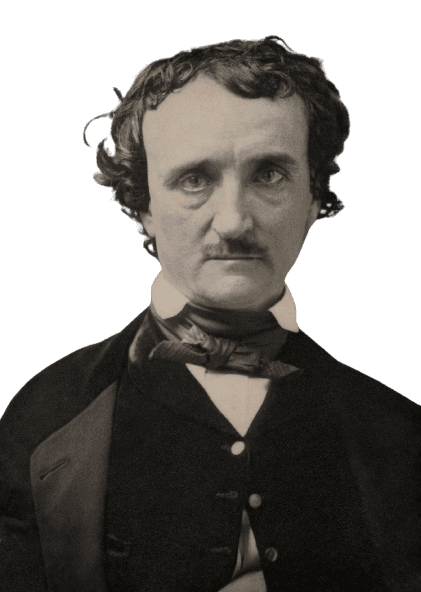Life and achievements
Early life
Edgar Allan Poe was born in Boston, Massachusetts, on January 19, 1809. His parents were David and Elizabeth Poe, both of whom were actors. Poe's father deserted the family in 1810, and his mother died of tuberculosis in 1811, thus leaving young Poe an orphan at the age of two. John and Frances Allan of Richmond, Virginia, took Poe into their home.
The Allans, who never officially took Poe into their fold, gave him a good home. Poe was enrolled in schools in England and Virginia, and he was good at writing and learning languages. Even though John Allan provided for Poe's needs, the two had a rather complex relationship characterized by conflict and alienation.
Poe entered the University of Virginia in 1826, but his stay was brief because he got into debt and could not pay for it or his gambling debts that his foster father refused to cover. This made Poe withdraw from the university and enlist in the United States Army under an alias in 1827. While in the military service, Poe issued his first book of poems, Tamerlane and Other Poems, which was not successful.
Frances Allan, Poe's foster mother, died in 1829, which caused Poe to make up with John Allan for a while. Poe then joined West Point Military Academy but was dismissed for negligence. This was the end of his military career and the beginning of his writing career as his full-time job.
Legacy
Edgar Allan Poe significantly impacted the world, and his works are still famous. He is considered one of the most brilliant gothic authors and the founder of the contemporary detective novel. Gothic elements and the analysis of the human mind are the features that distinguish Poe's works and have influenced the development of literature. His works have inspired many writers, such as H. P. Lovecraft, Sir Arthur Conan Doyle, and Stephen King have inspired many writers.
The introduction of detective fiction with Poe's story "The Murders in the Rue Morgue" paved the way for other literary detectives like Sherlock Holmes. His narrative strategies, which include the use of the unreliable narrator and the exploration of the unconscious, are some of the most common techniques used in today's literature.
Even though Poe lived a rather tragic life, with alcoholism and financial problems, his pieces are still popular and relevant. His poems, like "The Raven" and "Annabel Lee," are famous for their musicality and melancholy tone. Poe's work has permeated music, movies, and other aspects of culture.
Various museums and landmarks are also related to Poe and his works, such as the Edgar Allan Poe House in Baltimore and the Poe Cottage in New York. The Mystery Writers of America celebrate the memory of Poe through the Edgar Awards, which are given out each year for works in the mystery category.
Milestone moments
Feb 9, 1826
The University of Virginia
Edgar Allan Poe joined the University of Virginia to pursue a language course.
Unfortunately, he left the university after only one year due to his inability to pay his fees and some family issues.
Jun 9, 1827
Enlistment in the U.S. Army and First Publication
He joined the U.S. Army and used the name Edgar A. Perry; he released his first book of poems called Tamerlane and Other Poems.
This was the start of his literary career, although the book got little recognition.
Feb 9, 1831
The Removal from West Point
Poe was dismissed from West Point Military Academy for the lack of attention to duties, which ended his military dreams.
He relocated to New York, published a third volume of poems, and thus continued to build his career on writing.
Jan 9, 1845
The Raven
When "The Raven" was published, it became very popular, and thus, Poe gained much recognition across the nation.
Thus, the poem's success cemented Poe's position as one of the most prominent American poets and writers.
